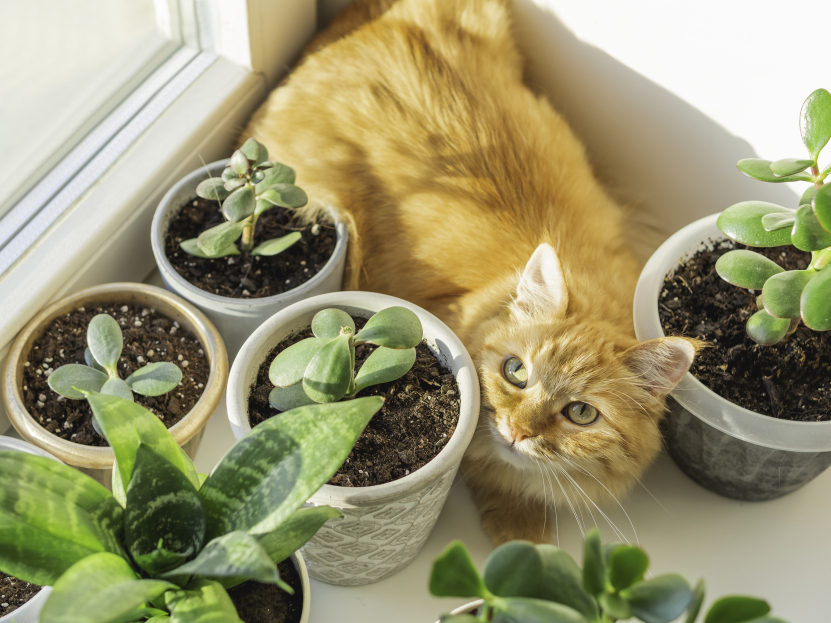
Plants, just like pets can make a home feel complete. They provide a sense of companionship, help relieve stress, and add warmth and character to your home. However, as many pet owners know, curious pets and plants cannot always coexist peacefully. Most houseplants pose no danger when touched, but it is not advisable to consume them for humans or animals. By learning about poisonous and pet-safe plants, you can help ensure that your pets stay healthy and happy!
Pet-safe and pet-friendly mean that a plant won't harm pets if eaten or cause skin problems if touched. The effects of “non-friendly" plants can range from mild to severe depending on the specific pet and situation. Also, keep in mind that animals can experience allergic reactions for a variety of reasons, from things like mold or mildew and even pollen. Like people, something that may not cause a reaction in one pet may cause an allergic reaction in another. So, when introducing a new plant into your home, it’s a good idea to monitor your pet’s reaction to see if there are any notable changes in behavior or abnormal skin reactions.
Different classes of animals and different species (i.e.: reptiles, birds, or even different mammals) can react differently because various plants produce different chemical compounds. Plants can inherently produce defense mechanisms like thorns or chemical compounds that help protect the plant from being harmed by one species, but not by another. For your specific pet, a veterinarian or knowledgeable pet supplier may be able to help provide more specific guidance.
If you have ever caught your pet eating your plant or come home to notice your plant has been chewed on, you should monitor your pet to see how they react over the next few hours and days. Note that signs of illness might not be present immediately, so consistently checking on your pet is important to spot any early signs or symptoms. If you think your pet may have ingested or been exposed to plants that are known to cause severe reactions, or if your pet appears to have difficulty breathing or vomits after exposure, you should immediately contact your local vet, animal hospital, or animal poison control center and seek precautionary treatment. If you’re not sure and want to be cautious, you can call the ASPCA Animal Poison Control Center (APCC) or emergency 24/7 Animal Poison Control Centre hotline, and they can advise you if you should seek immediate medical attention for your pet or what steps you should take to ensure your pet is okay.
If you notice any of the below symptoms, contact your local animal poison control center immediately.
· Vomiting
· Diarrhea
· Drooling
· Difficulty swallowing or eating
· Lethargic behaviour
· Stomach pain or dragging stomach/back legs
· Breathing difficulties or choking
After an unexpected health incident occurs with your animal, arrange a check-up with their usual doctor quickly. Make sure to tell the vet what happened so they can provide guidance on care and potentially give medications to help your pet heal.
Keep in mind that the consumption of any plant material by dogs and cats may cause vomiting or gastrointestinal upset. Plants listed by the ASPCA, “as either non-toxic, or potentially toxic with mild GI upset as their symptoms are not expected to be life-threatening to your pets.”
While the severity of reactions may vary, certain plants and flowers are known to cause more severe reactions than others. True lilies (Lilium spp.) and daylilies are known specifically to cause severe reactions and even kidney failure in cats, and slightly less severe reactions in dogs. Peace lilies and Calla lilies are not true lilies and therefore are not as harmful, but can still irritation or other adverse reactions, because they contain calcium oxalates. Azaleas and Sago Palms can also cause severe reactions like seizures and liver damage and should be avoided if you have furry friends. This is not a complete list but should help provide some guidance.
Whether you live in an apartment, a smaller space or in a house full of plants, there are different strategies you can use to help keep your pets safe indoors.
1) Place plants in a higher-up location Keep plants on top of your tallest shelves to ensure your pet can’t reach them. You can also purchase a hanging basket to put your plant in. Just be sure that your hanging basket is secure, or it can come crashing down and make access even easier for your pets. Placing your plants behind glass in a terrarium or shelf can also be ideal.
2) Fill your space with Pet-Friendly Plants Another option is to only fill your house with pet-friendly or pet-safe plants! This brings peace of mind because these plants are not known to be toxic or to cause specific harm to your furry friends. Below are 15 of our favourite Living House Plants that are pet friendly.
3. Peperomias (including Obtipan, Obtusifolia, Red Twist, Napoli Nights, String of Turtles, Watermelon Peperomia, etc.)
4. Fittonia (aka: Nerve Plant, Mosaic Plant)
8. Spider Plant
11. Calathea
12. Majesty Palm
13. Ponytail Palm
15. Canna Lily
Unsure if your plant is pet friendly? Search the Living House Website and look for the “Pet Friendly” Paw print icon on the plants page itself.
You can also use the search function to find all Pet-Friendly plants that we offer.
https://www.aspca.org/pet-care/animal-poison-control/toxic-and-non-toxic-plants
https://www.livinghouse.ca/search - Click the Pet-Friendly Radio button and search.